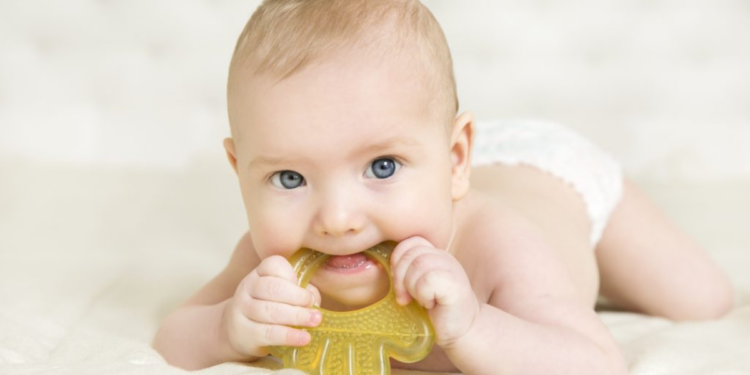Teething is an inevitable part of every infant’s development, but it often comes with a host of myths and misconceptions. For new parents, this phase can be exciting and bewildering, as the arrival of those tiny teeth can disrupt the entire family’s daily routine, especially sleep patterns. In this guide, we will suggest some ways to help your teething baby find comfort and relief. We’ll also address a recurring question in every parent’s mind: “Do pacifiers help with teething?”
Do Pacifiers Help With Teething?
Pacifiers, or soothers, have been a go-to comfort item for many parents, and they can play a crucial role during your baby’s teething process. These tiny, nipple-shaped devices offer your child something to suck on, which, in turn, provides a sense of relief. Here’s how they work and why they might be helpful during teething.
Pressure and Comfort
Pacifiers function similarly to toys by exerting gentle pressure on your baby’s gums. This pressure can help alleviate the discomfort caused by teething. However, they offer more than just physical relief. Pacifiers often provide emotional comfort as well. Many babies find solace in the act of sucking, which can help them relax and feel secure. It’s essential to ensure that you have a clean pacifier at the ready when your little one is teething.
Teething Massages: A Proactive Approach
A proactive solution to ease your baby’s teething woes is massaging their gums. You can utilize a clean finger or a baby-safe rubber tool to perform this gentle massage. Here’s how to do it effectively:
Performing a Teething Massage
- Ensure Cleanliness: Wash your hands thoroughly or use a baby-safe rubber tool that has been sanitized to prevent any germs from entering your baby’s mouth
- Gently Rub the Gums: Using your clean finger or the rubber tool, gently rub your baby’s gums. You’ll want to pay close attention to the areas where the new teeth are emerging. If your baby doesn’t cry or pull away, continue the massage for a few minutes
- Observe the Effects: You’ll likely notice a positive effect from the massage, as it can help soothe the discomfort associated with teething
- Repeat as Needed: Whenever your baby gets fussy due to teething discomfort, consider repeating the massage. It can be a valuable tool in your teething relief toolkit
Understanding Teething Medicine
Teething medicine can provide relief for your baby, but it’s essential to exercise caution and consult your pediatrician before administering any medication. Approved teething remedies can be highly effective when used correctly, but there are some key points to remember:
Consult Your Pediatrician
Before giving your child any medicine for teething, it is crucial to consult with your pediatrician. They can provide guidance on which medications are safe and appropriate for your baby’s age and condition.
Follow Directions Carefully
If your pediatrician recommends teething medicine, it’s essential to follow the provided directions meticulously. This ensures that your baby receives the proper dose and experiences the intended relief.
Avoid Numbing Agents on Gums
One critical point to remember is never to use numbing agents directly on your child’s gums. These agents can be dangerous if swallowed, and they are not suitable for young children. Numbing gels and ointments may contain ingredients that can lead to adverse reactions, making them unsuitable for teething relief.
In Conclusion: Do Pacifiers Help With Teething?
The question often arises: “Do pacifiers help with teething?” The answer is yes but with some essential considerations. Pacifiers can provide a measure of comfort and relief during the teething process. They work by exerting gentle pressure on your baby’s gums and offering emotional comfort through sucking.
However, it’s vital to ensure that pacifiers are kept clean and in good condition. Hygiene is crucial to prevent the introduction of harmful germs into your baby’s mouth.




